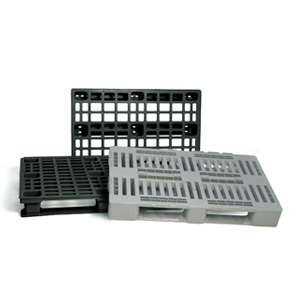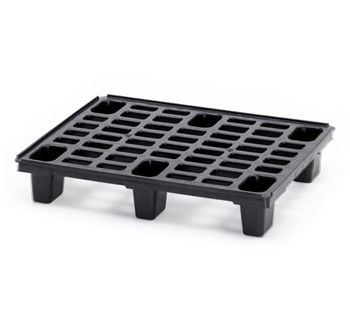Plastic pallets have been available for the past 28 years, but it is just recently that their use has been growing at an unprecedented rate. The combination of health and safety considerations, quarantine conditions and environmental regulations has contributed to a sharp increase in the demand for used, as well as new, plastic pallets over the last decade.
Industrial Uses
 Industries such as electronics, household goods, food and beverages, pharmaceuticals, construction and logistics, among many others, have switched from using wooden to plastic pallets. This is because the plastic version has 50 times the operational lifetime of the wooden version, as long as it is employed correctly according to its temperature and load specifications. Plastic pallets are now a necessity in the grocery sector for handling fresh produce as well as frozen food items.
Industries such as electronics, household goods, food and beverages, pharmaceuticals, construction and logistics, among many others, have switched from using wooden to plastic pallets. This is because the plastic version has 50 times the operational lifetime of the wooden version, as long as it is employed correctly according to its temperature and load specifications. Plastic pallets are now a necessity in the grocery sector for handling fresh produce as well as frozen food items.
The pharmaceutical, electronic and food sectors often require ultra-clean storage and transportation facilities. A plastic pallet can be sterilised up to temperatures of 120 degrees C if necessary without losing any of its strength and durability.
Space and Safety
 With space at such a premium in many major cities, the plastic pallet has found a special application in warehousing. Not only are they more compatible with current automated methods of materials handling, but they can stack up in a small space when not in use. They can even be stacked outdoors in all conditions during those periods when storage space is tight. This provides a significant cut in shipping and warehouse space costs. An equivalent wooden pallet can only survive a few re-uses in a warehouse before it splinters and breaks, possibly hurting an employee or customer.
With space at such a premium in many major cities, the plastic pallet has found a special application in warehousing. Not only are they more compatible with current automated methods of materials handling, but they can stack up in a small space when not in use. They can even be stacked outdoors in all conditions during those periods when storage space is tight. This provides a significant cut in shipping and warehouse space costs. An equivalent wooden pallet can only survive a few re-uses in a warehouse before it splinters and breaks, possibly hurting an employee or customer.
The plastic pallet is also significantly lighter than its wooden counterpart and has a smooth finish, with neither nails nor sharp corners. All this lowers any danger of injury at the workplace. Moist conditions adversely affect wooden pallets. They absorb water from the atmosphere and increase their weight while losing some of their strength. A plastic pallet remains the same in moist conditions. They are also impervious to fats, acids and solvents.
There are even greater advantages with used plastic pallets. They can be cleaned, disinfected and returned to distributors. A wooden pallet may collect fungus and bacteria during its use and can be of no further service.
Recyclable used plastic pallets provide a further benefit. Not only do they cut the disposal costs when their useful lifespan is over, but they can be converted into other plastic goods.
Cost-Effectiveness
 Retailers and manufacturers have often doubted the cost-effectiveness of pallet pallets because their cost is higher than wooden ones. However, these costs amortise over the lifetime of the plastic pallet, making them an extremely cost-effective article. The average cost of a used wooden pallet is about half that of the used plastic version. But as the plastic pallet last up to 50 times as long as the wooden one, the advantage is obvious. So when retailers and manufacturers see any plastic pallets for sale, they should stock up as soon as possible.
Retailers and manufacturers have often doubted the cost-effectiveness of pallet pallets because their cost is higher than wooden ones. However, these costs amortise over the lifetime of the plastic pallet, making them an extremely cost-effective article. The average cost of a used wooden pallet is about half that of the used plastic version. But as the plastic pallet last up to 50 times as long as the wooden one, the advantage is obvious. So when retailers and manufacturers see any plastic pallets for sale, they should stock up as soon as possible.





Comments are closed.